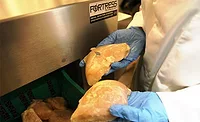How data loggers keep food safe
Anyone transporting food that’s meant to be consumed by others has a responsibility for safety.

Food safety is a top priority for all refrigerated transporters. While it’s critical for a shipment to make it from Point A to Point B, transportation itself is never enough. Anyone transporting food that’s meant to be consumed by others has a responsibility for safety. Not only can mistreatment of food during transport result in contamination, it can also damage a company’s reputation.
The most effective way to maintain quality control within transport is by utilizing real-time data monitoring with a connected high-precision data logger. Typically, a traditional data logger accompanies the food shipment at Point A, and the employee at Point B reads the logger to determine whether the food was kept in an acceptable temperature range. If the food is stored outside of the standard temperature range, the only course of action would be to throw out the entire shipment. While this may not be the worst thing in the world when shipping food products that are less expensive, disposing of an entire shipment of prime-cut steak or seafood can cost businesses upwards of hundreds of thousands of dollars.
Transport companies are liable for these temperature issues, especially if corrective action isn’t taken. Such temperature issues can even stem from drivers shutting off refrigeration while they sleep to save diesel fuel. With a traditional data logger, there’s no way for a consignor to know whether this occurred or not, until it’s too late to save the consignment. However, cellular-based technology allows consignors to do real-time monitoring without any interaction with the transport company. Because many shipments are made using third-party transporters, cellular-based data loggers are becoming increasingly popular for maintaining trust between the transporter and all other segments of the supply chain. These wireless loggers also allow a trusted driver to monitor conditions while en route, allowing him/her to take corrective action before temperatures reach critical ranges.
Transporters must also be fully aware of the Food Safety and Modernization Act (FSMA). This factor makes quality data loggers even more important; transporters may have to verify at any given moment that food was handled properly while in their possession. FSMA also emphasizes the importance of data logging technology. The act requires food handlers to develop a plan that meets the guidelines for Hazard Analysis and Critical Control Points (HACCP), which should involve an advanced data logger. Issues with data entry, misreading and misinformation are the responsibility of the transporter, and failure to comply with these guidelines can result in seizure, injunction and recalls, all of which can damage the reputation of the entire supply chain.
With all things considered, investing in a data logger with cellular technology can save thousands of dollars and hours worth of hassle. Because these data loggers can be monitored by others in the supply chain in real-time, the transporter can become aware of issues regarding temperature before the only safe course of action becomes product disposal.
Loggers help save money in the form of legal fees, compensation and premiums, while also drastically reducing the risks of a public relations disaster. Some data logger companies also offer free cloud storage, allowing monitoring and analytics tracking in all locations, at any time of day.
Even though the costs of non-compliance in the food handling industry are tremendous, it’s important for transporters to understand that implementing a high-precision, connected data monitoring tool can put these issues to rest.
Looking for quick answers on food safety topics?
Try Ask FSM, our new smart AI search tool.
Ask FSM →








